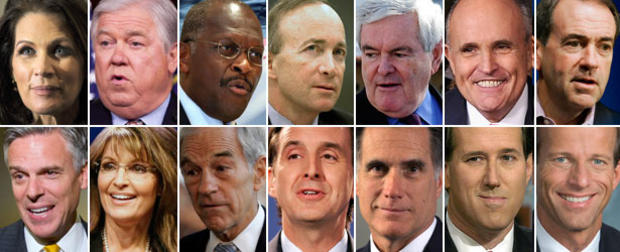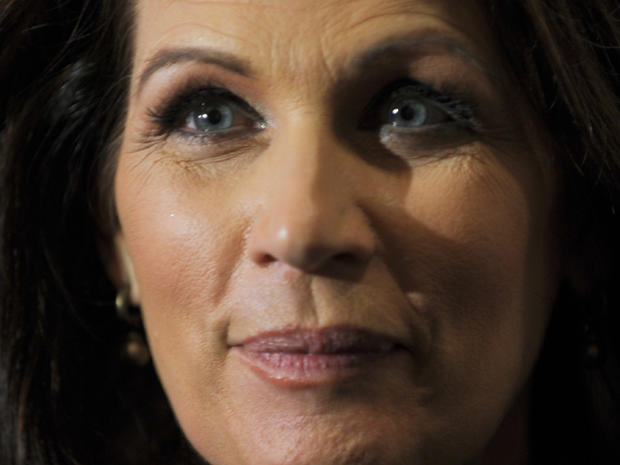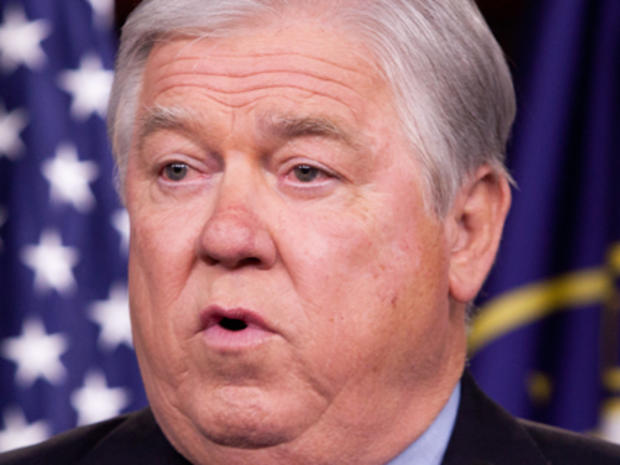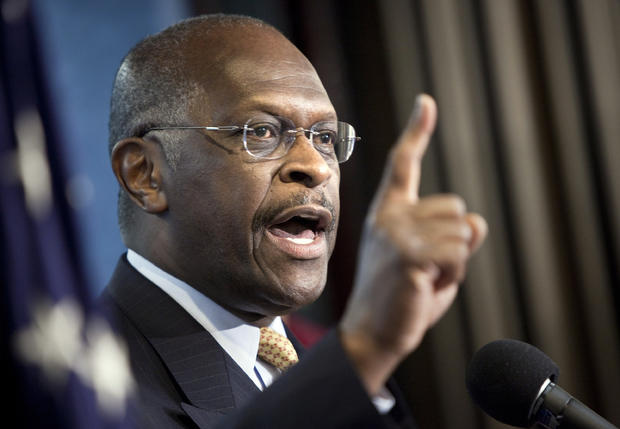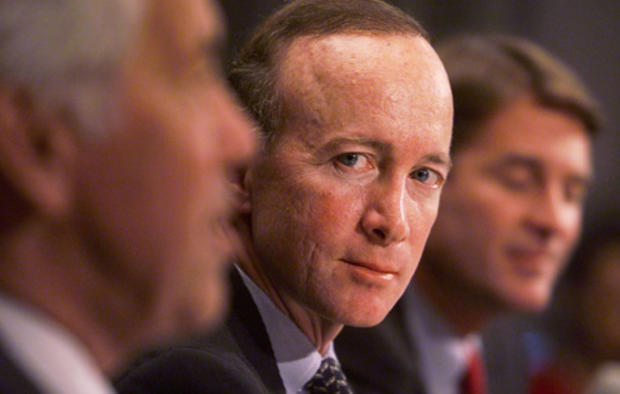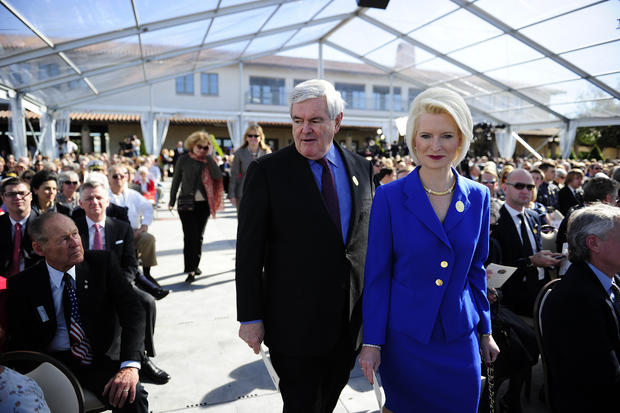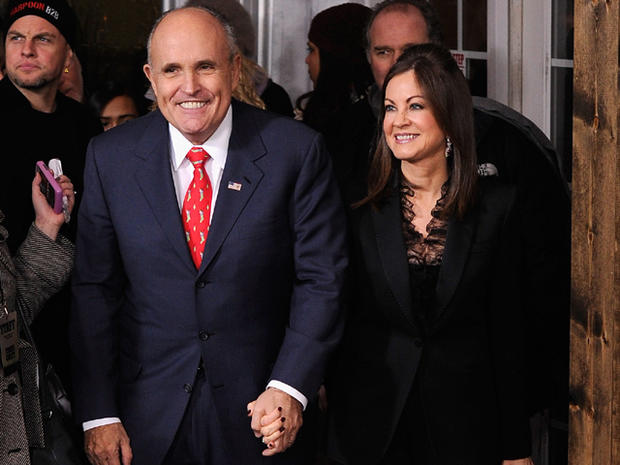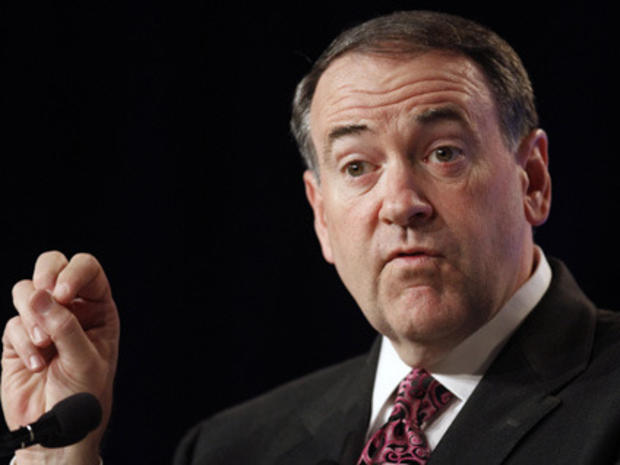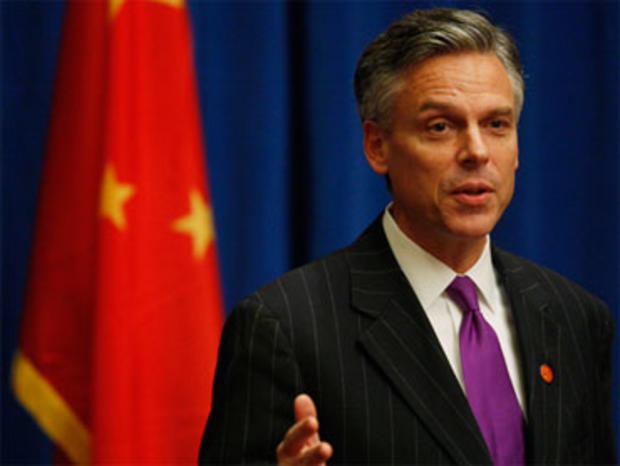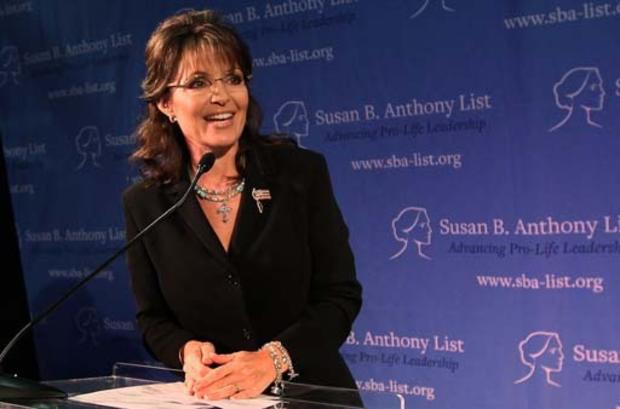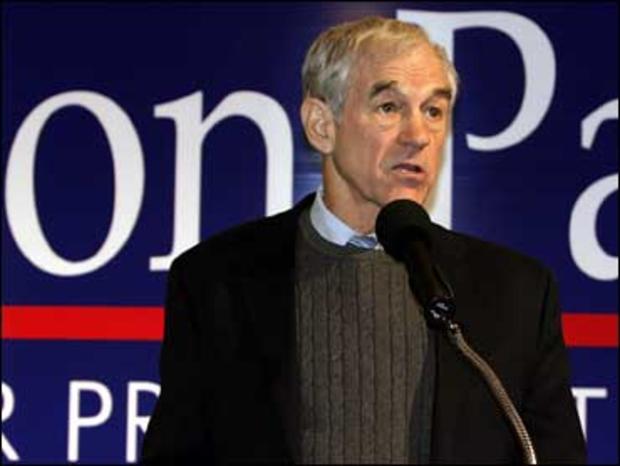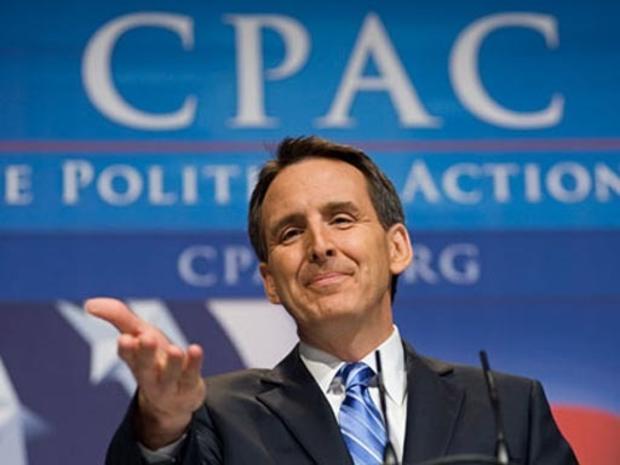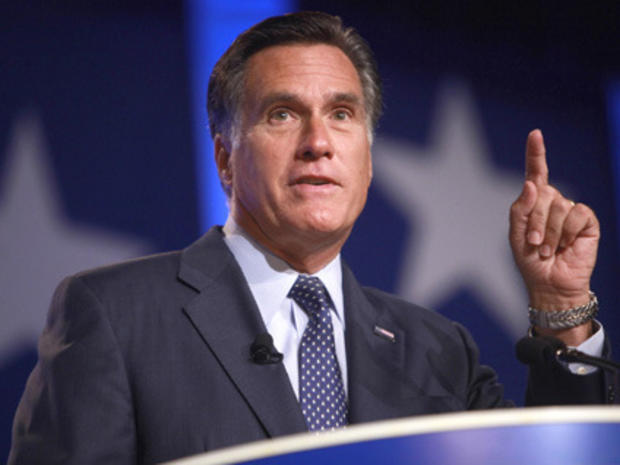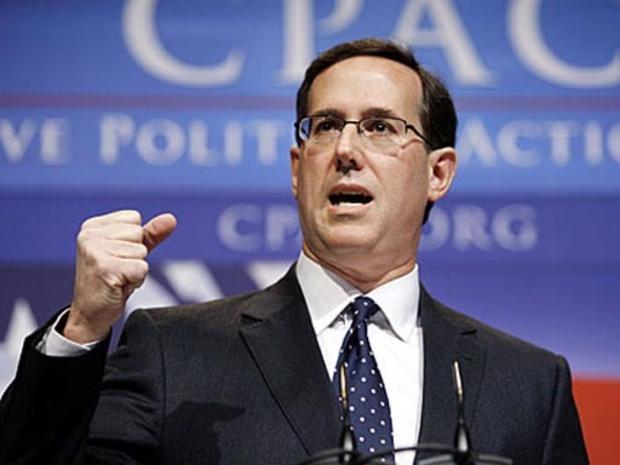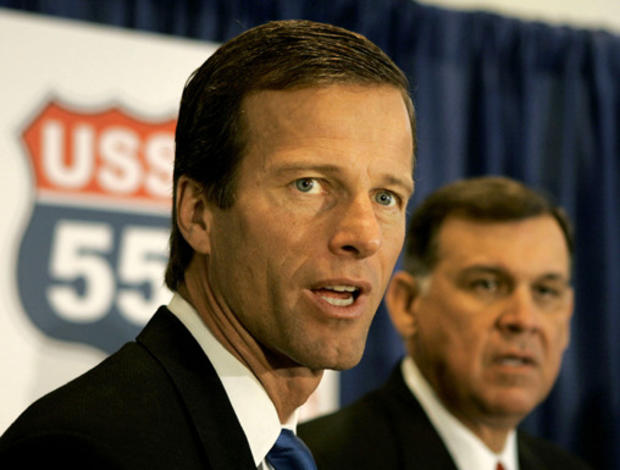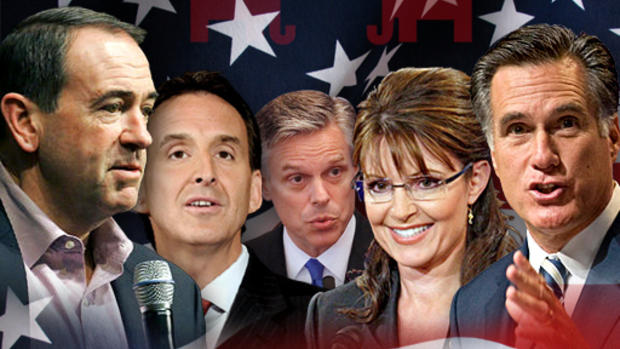Sizing Up the 2012 GOP Presidential Contenders
To the casual observer, it may seem early to be sizing up the 2012 Republican presidential field.
But despite the fact that only one hopeful has announced plans to run thus far - that would be former Godfather's Pizza CEO and relative unknown Herman Cain - likely candidates have been working feverishly behind the scenes to lay the groundwork for a credible run at the GOP nomination. They've been lining up staff, speaking to key constituencies in early voting states like Iowa, South Carolina and New Hampshire, raising their profile through media appearances, and building the fundraising networks crucial to emerge from what will likely be a crowded primary field.
(At left, Brian Montpoli, Robert Hendin and Jill Jackson discuss this story, CPAC and the 2012 campaign.)
For a second-tier potential candidate, CPAC is a prime opportunity to show they can galvanize the base; for a top-tier contender, it's a chance to shore up support among their core constituencies and make a case to the skeptics.
Below you'll find a brief sketch of 14 candidates that CBS News sees as potentially serious challengers for the nomination with a focus on their strengths and weaknesses. Some, like former Govs. Mitt Romney and Tim Pawlenty, are widely expected to run; others, like Michele Bachmann and John Thune, appear to be testing the waters and unsure whether they will join the fray. It is by all accounts expected to be a wide-open field, with no clear frontrunner and plenty of wildcards (the influence of the Tea Party movement, Sarah Palin's role as candidate or endorser) that could upend the process at any point.
Without further ado, here are the contenders, listed in alphabetical order:
Michele Bachmann
When third-term Rep. Michele Bachmann launched the House Tea Party Caucus last year, it was a clear signal of her political ambition. The conservative Minnesotan has been a vocal critic of the Obama administration and a leading anti-health care voice around the Capitol. Bachmann recently delivered the first ever Tea Party response to the State of the Union and instituted another first, -- a lecture on the Constitution for members of Congress conducted by conservative Supreme Court Justice Antonin Scalia.
Strengths: First and foremost: money. Bachmann is a prolific fundraiser and she's able to use the Tea Party label to her financial advantage. She has been all over Iowa, meeting with important Republicans who could help facilitate a run. And with fellow conservative Representative Mike Pence not running, Bachmann can try to lay claim to the social AND fiscally conservative mantle.
Weaknesses: She's a somewhat-isolated figure in Congress whose attempts to join House leadership were rejected. Her rhetoric and aggressive posture have earned comparisons to the most divisive aspects of Sarah Palin. And her post-State of the Union speech was panned both for content and staging, as Bachmann was seen on network television pointing at hokey bar graphs and looking at the wrong camera.
Haley Barbour
The Mississippi governor made a lot of friends in the 2010 election cycle as head of the Republican Governors Association, when he oversaw a GOP pickup of five governor's mansions.
Strengths: Fundraising. Barbour has a strong, national donor base. And an impressive operation with his political action committee, HaleyPAC. Barbour is also well liked in Washington and known for his personal charm.
Weaknesses: Barbour is a former tobacco lobbyist who will have to battle the perception that he is a consummate DC insider - he was previously the head of the Republican National Committee and is a long-time Washington power broker. He made an early mistake in praising the segregationist "citizens councils" that resisted integration through economic and political pressure.
Herman Cain
A business executive and conservative columnist, Cain is a relative newcomer to the national political scene. In the 1990s, he leveraged his role as head of the National Restaurant Association to fight for business interests during President Clinton's attempt at health care reform. On his website, the former Godfather's Pizza CEO asks "fellow patriots" to rally behind him because the "American dream is under attack."
Strengths: He's the only African-American Republican in the field. He has earned early attention because he was the first candidates to file the paperwork and declare a run for the presidency.
Weaknesses: He lacks the name recognition, infrastructure, and support to make a serious run for the White House.
Mitch Daniels
Indiana Governor Mitch Daniels, who is currently serving his second term, and has garnered buzz for his fiscal conservatism and his low-key style. His background is in business and politics, having worked both in the pharmaceutical industry and as an adviser to President Ronald Reagan and head of the Office of Management and Budget under President George W. Bush.
Strengths: Daniels has a successful business record like Mitt Romney -- but without having passed a health care bill mandating coverage while serving governor. He has offered of the most thought-out criticisms of the health care bill, explaining in a recent Wall Street Journal op-ed that the costs to states is just too high.
Weaknesses: Daniels may have already committed a fatal blow to his campaign when he proposed that Republicans call a truce on social issues. That's not a popular stance in socially-conservative Iowa and South Carolina, crucial early voting states. Daniels also would struggle with name recognition and fundraising early in the process.
Newt Gingrich
The former Speaker of the House seems to toy with the idea of running for President every election cycle. But this time it looks like Gingrich may pull the trigger. He orchestrated the GOP takeover of the House in 1994 behind the "Contract with America" and today is a regular political analyst on Fox News. He's also authored 23 books.
Strengths: Gingrich is ambitious and is seen within his party as an idea man who understands policy. And he works hard to get what he wants. One GOP watcher in Iowa even has Gingrich at the top of his list of potential 2012 candidates, writing, "one would be hard pressed to find a candidate that's done more to reach out and talk to Iowans over the past year or so than Newt Gingrich."
Weaknesses: Gingrich's personal history -- he's been married three times -- could hurt him with social conservatives. His speaking tours and frequent media appearances also provide a treasure trove of controversial comments that opponents can cite to criticize the former speaker. And Gingrich is anything but a fresh face.
Rudy Giuliani
The Mayor of New York City on September 11 is considering a second bid for the White House. Giuliani made his name nationally as a security-minded mayor who dealt with terrorism first hand. Before his two terms as mayor, he was U.S. attorney for New York during the Reagan Administration. Giuliani ran for president in 2008, but quickly became an also-ran as his drive fizzled in the early primaries. He's been out of office in the years since.
Strengths: Giuliani is a moderate, no-nonsense, pro-security Republican. His work reforming the nation's largest city is still remembered and his tough on crime, tough on terror beliefs could play well with most voters, particularly if the debate shifts to national security.
Weaknesses: His poor showing in 2008 suggests that many voters aren't very excited about a Giuliani candidacy. He is not particularly known for fiscal conservatism, the animating issue for the Tea Party. And his moderation on social issues is a hard sell with socially conservative voters.
Mike Huckabee
Mike Huckabee's had about nine different lives so far. This former Arkansas governor, who won the Iowa caucuses in the 2008 presidential election, is the author of seven books. He is also the bass player in his band called Capitol Offense. His latest book tour will take him to both Iowa and South Carolina, though it's not yet clear if he will give up his current post as a successful Fox News host and radio personality to run for president again in 2012.
Strengths: Huckabee, a former Baptist pastor, is enormously popular with the Christian right and the GOP base more broadly. He is a known and reliable social conservative amidst a largely fiscal conservative field. Plus Huckabee has that certain likeability factor.
Weaknesses: Huckabee's opponents could attack his judgment by pointing to his decision as governor to commute the 35-year sentence of Maurice Clemmons, who killed four police officers in Washington State in 2009. Fiscal conservatives have criticized him for his spending as Arkansas governor, and he lacks the fundraising network necessary to maintain a campaign.
Jon Huntsman
The former two-term governor of Utah was picked by President Obama to fill a foreign policy role - U.S. ambassador to China. He had previously served under President Reagan and later in the federal government as deputy assistant secretary of commerce for Asia, U.S. ambassador to Singapore and deputy U.S. trade representative. Part of his selection as ambassador comes from the fact that Huntsman spent years living in Asia and is fluent in Mandarin Chinese.
Strengths: Huntsman has the top foreign policy chops of anyone in the GOP field. He knows business and knows the economic issues facing the country and the business community vis-a-vis China. And he's a fresh face - he's new to the field and only 50 years old. Huntsman got a big boost recently when he announced he's stepping down from the ambassadorship to return to the United States and, presumably, contemplate a presidential run. He's a relative moderate and if he could break out in the primaries could be a formidable foe for his former boss.
Weaknesses: He worked for Barack Obama, one of the few people GOP primary voters agree on (it seems they don't much like him). It could be tricky for Huntsman to show separation from the Obama Administration and its policies. Beyond that, Huntsman would have trouble with social conservative GOP voters, particularly in Iowa, for his support for same sex unions. Fiscal conservatives, meanwhile, will object to his support for Cap-and-trade energy proposals. Huntsman also could face questions, like Romney, about his Mormon faith.
Sarah Palin
The half-term Alaska governor who became a household name when John McCain chose her to be his 2008 running mate has a larger-than-life public image. Since resigning as governor, Palin has made millions of dollars writing books, giving speeches, appearing on Fox News, and hosting her own reality television show. She has recently reportedly trademarked her own name and has been one of the most vitriolic critics of President Obama.
Strengths: Loyal supporters and vast name recognition. Love her or hate her, Palin is a household name. And the millions of Americans who support her do so very strongly. Her influence was illustrated last year when she boosted dozens of successful congressional candidates with her endorsement.
Weaknesses: Along with high name recognition comes high negatives. The more most Americans learn about Sarah Palin, the less they seem to like her. According to a recent CBS News poll, 57 percent of Americans now have unfavorable opinions of Palin. Her public missteps in response to the shooting in Tucson and President Obama's State of the Union have further eroded her public support.
Ron Paul
The long-serving Texas congressman could be considered the godfather of the Tea Party. His supporters describe him as "America's leading voice for limited, constitutional government, low taxes, free markets, and a return to sound monetary policies." His son Rand Paul was recently elected to the Senate as one of the original Tea Party-backed candidates.
Strengths: Paul's limited government vision has a loyal following. He has been a unique voice in presidential politics, and he generated passionate support in his 2008 presidential run. He has a consistent record having voted against bailouts for big banks.
Weaknesses: His loyal following is rather limited, and while his brand of conservatism may have been unique in years past, the Tea Party movement grew without him as its leader. He would now face many better known Republican opponents who also espouse similar conservative ideals.
Tim Pawlenty
The former two-term Minnesota Governor Tim Pawlenty, nicknamed "T-Paw," has been hitting the national pavement since the end of his governorship to drive up his name recognition, and he is almost assuredly running for president. Pawlenty is currently on a book tour and has made frequent stops to the key caucus/primary states of Iowa and New Hampshire.
Strengths: Pawlenty has credibility as both a fiscal conservative AND as a social conservative. He passed tax cuts as governor and balanced the budget every year. He's also tried to make an effort to appeal to a broader GOP base, saying that Republicans must reach out to "Sam's Club Republicans" -- not just country club Republicans.
Weaknesses: Many pundits have said that Pawlenty's biggest problem is blandness. But name recognition could also be a challenge for the former governor. Pawlenty has also been accused of possibly being too nice to make it in a cut-throat GOP field.
Mitt Romney
Mitt Romney is not just the former governor of Massachusetts. He's also a former CEO of a venture capital firm and the president of the 2002 Winter Olympics in Salt Lake City. Romney made a strong run for president in 2008 but lost the GOP nomination to Sen. John McCain.
Strengths: Romney's successful business background makes him an ideal candidate in still-troubled economic times. He has a successful record turning the Salt Lake Olympics around after it amased $379 billion in debt. Romney also has a strong fundraising advantage with nearly $800,000 cash on hand as well as personal wealth.
Weaknesses: President Obama's Chief of Staff Bill Daley recently joked that "ObamaCare" used to be known as "RomneyCare." The fact that Romney signed a health care bill in Massachusetts that required people to purchase health insurance (and even created a state-run health care program) is already a thorn in Romney's side. Romney also will face questions similar to ones he was forced to answer in the 2008 campaign about his Mormon faith.
Rick Santorum
The former two-term senator from Pennsylvania was known for being one of the more socially-conservative members of Congress. One of his top accomplishments was writing the bill that banned partial birth abortions. Santorum is certainly laying the groundwork for a presidential campaign. A Republican operative in New Hampshire says that the former senator has traveled to that state more than ten times.
Strengths: Santorum will bank on his conservative bona fides. His social stances play well among Iowa voters and his conservative fiscal views will help with Tea Partiers. He has also been active in early primary states to lay the groundwork for a run.
Weaknesses: He's not as well-known as some of the other top conservative candidates. His embarrassing 18-point loss in his reelection bid in 2006 has not been forgotten. And he may be too conservative for moderate voters in New Hampshire, Florida, and other key states.
John Thune
John Thune is serving his second term as South Dakota senator, and is a member of GOP Senate leadership. His background is mostly political, having served in the U.S. House and as an aide to former Senator Jim Abdnor.
Strengths: Almost every profile of Senator Thune mentions his handsome -- aka presidential -- good looks. But Thune also has a record of taking down powerful politicians, having ousted then-Senate minority leader Tom Daschle in the 2004 election.
Weaknesses: Name recognition will be tough for Thune. Another major problem is his vote for the bank bailout, known as the TARP, in 2008. That bailout is considered the original sin by the Tea Party movement.
Read more about the top contenders in our photo gallery below:
Brian Montopoli is a senior political reporter for CBSNews.com. Robert Hendin and Jill Jackson are senior political producers for CBS News.
